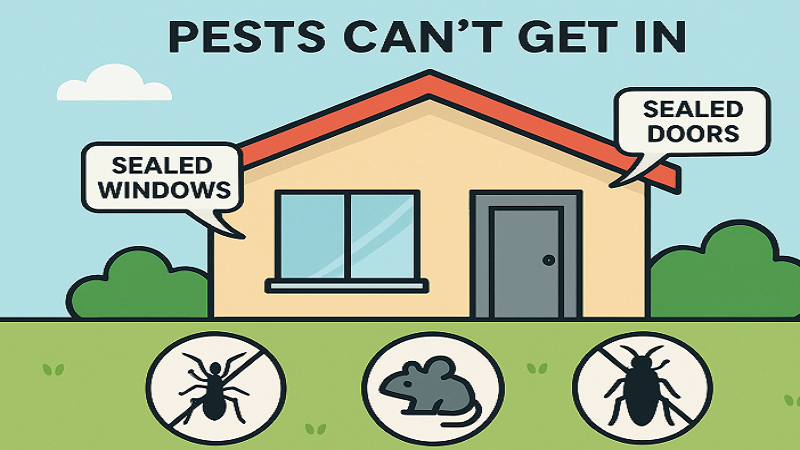Key Takeaways
- Regular cleaning and home maintenance can prevent the most common household pests.
- Sealing entry points is crucial for keeping insects and rodents outdoors.
- Safe use of natural and chemical pest control methods can reduce infestations.
- Early detection and intervention can keep minor pest issues from becoming major problems.
- Weather changes can impact pest behavior and entry into homes.
- A combination of proactive steps and monitoring results in consistent, adequate protection.
Pest Pressures: Why Prevention Matters
A pest-free home is essential for both comfort and safety. While it might seem easy to overlook a few ants or the occasional spider, the reality is that pests can quickly multiply and compromise your living space. Certain intruders, like rodents and cockroaches, are known to spread disease and contaminate food, while others can trigger allergies or cause structural damage. For residents facing persistent pest pressures, seeking expert pest control in Boston can offer reliable, long-term solutions tailored to your home’s unique needs.
Effective prevention isn’t just about addressing infestations when they happen—it’s about taking proactive steps throughout the year. Homeowners who implement prevention routines see far fewer pest issues, less property damage, and reduced health risks. Routine vigilance, especially during seasonal changes, is essential for maintaining your space’s protection and preserving your peace of mind.
Common Entry Points You Shouldn’t Ignore
Pests don’t need wide-open doors to get inside. They exploit the tiniest weaknesses along your home’s exterior—the cracks around windows, gaps beneath doors, holes in screens, and even poorly sealed vents. Regularly inspecting and sealing these entry points can dramatically reduce the chances of an unwelcome invasion. Using materials like caulk, weatherstripping, and wire mesh is especially important during the transitional seasons when critters are actively seeking shelter from harsh weather.
Cleaning Habits That Discourage Pests
While other prevention measures are essential, nothing beats the basics: cleanliness. Pests are drawn to food scraps, standing water, and cozy hiding spots. Establishing consistent kitchen hygiene, such as wiping counters, emptying trash bins, and cleaning up spills immediately, starves pests of the resources they seek. Don’t forget hard-to-reach areas like under sinks, inside pantries, and behind appliances, where crumbs and moisture can accumulate unnoticed. For more detailed guidance on safe pest control practices, the EPA offers practical dos and don’ts that can help you keep your home pest-free. Regularly inspecting your home for signs of pests can help catch infestations early. Combining vigilance with proper hygiene creates a strong defense against unwanted intruders.
Natural Remedies for Routine Protection
Many families want safer, less-toxic approaches to pest control, especially where children or pets are present. Diatomaceous earth—a natural, abrasive powder—can be used in crevices and along baseboards to deter crawling insects. Essential oils such as peppermint, citronella, or tea tree oil are another gentle option, disrupting pest scent trails and repelling common invaders. For best results, natural remedies should be combined with other proactive strategies.
Choosing the Right Pest Solutions
Sometimes, DIY techniques aren’t enough, and more direct intervention is necessary. Selecting the appropriate pest control method depends on the type of pest, the extent of the infestation, and safety considerations for household members. Traps are generally the safest bet for rodents, while baits and targeted sprays work best for ants and cockroaches. Always follow manufacturer instructions for any product used, and consult a licensed professional if you’re unsure—especially for more hazardous pests like termites or wasps.
How Seasonal Changes Affect Pest Activity
As the weather changes, so does pest behavior. Warm months bring increased insect activity, including mosquitoes, ants, and flies, due to higher temperatures and humidity. When temperatures drop, rodents and spiders seek warmth and food indoors. Staying ahead of these seasonal patterns—by decluttering storage spaces, maintaining yard areas, and reinforcing vulnerable points—can limit pest access as the seasons shift.
Spotting Infestations Early—And Addressing Them Fast
The sooner you catch the signs of an infestation, the easier it will be to resolve. Look for physical clues: droppings, shredded paper or insulation, chew marks, and unexplained odors. Finding these early means you can take targeted action—like setting traps or using appropriate treatments—before things spiral.
The Power of Proactive Monitoring and Regular Checks
Regular home inspections are your strongest defense against pests. Schedule monthly walkthroughs of often-neglected spots: attics, crawl spaces, basements, behind appliances, and around food storage areas. Catching small issues—such as damaged packaging or new entry points—can prevent a significant infestation. Everyone in the household should stay alert to potential warning signs; team vigilance will help spot activity early and make ongoing protection much more straightforward.
When to Seek Professional Assistance
While every homeowner can take active steps toward prevention, certain situations call for professional support. If you notice repeat infestations, unexplained property damage, or structural warning signs (especially involving wood or wiring), it’s time to bring in expert help. Skilled professionals can diagnose complex problems, use safer and more targeted treatments, and offer insights that prevent future outbreaks—saving you stress, time, and money in the process.
Final Thoughts: Staying Ahead of Pests for Good
Maintaining a pest-free home isn’t achieved with a single fix; it’s about building lasting habits. By regularly cleaning, sealing, monitoring, and choosing effective solutions, you vastly improve your home’s defense against unwanted visitors. Consistent care and quick responses are your best tools for a pest-free, safe, and comfortable home all year round.

